Those who knew him described a man who was as humble as he was accomplished, someone who was enthusiastic about science and who readily pitched in to advance the graduate school and help support the education of its students.
“He was so giving, so open to helping people,” said Jay Breyer, Ph.D., GSAS ’81, who served with Thampoe over the past two decades on the leadership committee, formerly known as the dean’s advisory board. “He was always the first person in the room I would go and talk to, because he was just a terrific person, very friendly, open, warm, generous.”
Thampoe was an immigrant from Sri Lanka who earned not only undergraduate and graduate degrees in science from Fordham but also a Juris Doctor degree from Fordham Law School. He lived with his family in Mahwah, New Jersey, and worked at Regeneron Pharmaceuticals in Tarrytown, New York, as executive director and assistant general counsel for intellectual property portfolio development.
Accomplished, Yet Humble
He served as president of the New Jersey Intellectual Property Law Association, and chaired and spoke at many biotechnology patent law conferences in Boston, London, Munich, New York, and San Francisco, according to an obituary from his family. In 2018, he was a recipient of the Outstanding 50 Asian Americans in Business Award, bestowed by the Asian American Business Development Center.
A tennis enthusiast who had managed the squash and tennis teams as a Fordham undergraduate, he was a player captain of U.S. Tennis Association adult teams and led more than 10 teams to the national championships and won a Captain of the Year award in 2017.
And yet, he was quiet—even bashful—about all he had achieved, said his daughter, Emily Thampoe. She added that her father’s Catholic faith “was very important to him and an integral part of his life.”
“I think the fact that numerous people have asked to have him as their child’s godfather is a testament to the kind of person that he was,” she said.
An Immigrant Story
Thampoe came to America to attend Fordham Preparatory School on scholarship, and went on to earn three degrees in biology from Fordham with support from scholarships and assistantships: a bachelor’s degree from Fordham College at Rose Hill in 1980 and master’s and doctoral degrees from the Graduate School of Arts and Sciences (GSAS) in 1982 and 1986, respectively. He was a postdoctoral research fellow and research associate in tumor immunology at Memorial Sloan-Kettering before returning to Fordham for his law degree, which he completed in 1994.
After working in a few law firms’ patent law and intellectual property areas, he served as in-house patent attorney at Schering-Plough and managing intellectual property counsel at Merck before making the move to Regeneron.
He made an impression as a member of the GSAS Dean’s Leadership Committee, a group of alumni leaders, parents, and friends of Fordham who serve as advisers to the dean and as the University’s ambassadors and advocates.
Leadership and Enthusiasm
“It was a real pleasure working with him,” said Tyler Stovall, Ph.D., who became dean of GSAS in July 2020. “He was always very enthusiastic and had lots of solid ideas. He was very interested in bringing more people of color into STEM, and he had a particular commitment to improving the mentoring of graduate students. This is a very sad loss for us; we will miss him greatly.”
Thampoe spoke often to to students in the Graduate School of Arts and Science, in Fordham Law School, and in the undergraduate and graduate programs in biological sciences, and was committed to helping students continue their education through graduate school so they could realize the possibilities for STEM careers, said Michelle Clarkin, director of development for Arts and Sciences.
In 2007, he created a scholarship named for Edward Benedict, GRE ’67, and Robert Hawthorn, FCRH ’53, both of whom were Fordham Prep faculty members, and the latter of whom was coach of squash and tennis at Fordham for more than 50 years. The scholarship benefits undergraduate and graduate students in biology who demonstrate academic merit and financial need.
Breyer recalled a Zoom meeting of the committee in March 2020, as the newly arrived pandemic and its impact on children were weighing on the members. Thampoe lifted their spirits, Breyer said, by describing work being done at Regeneron, which would later develop a breakthrough monoclonal antibody treatment for COVID-19.
“He spoke up and said, ‘Well, let me tell you what my company is doing,’” Breyer said. “It was exhilarating to hear him speak about it, and he was really excited about it. And that excitement, I think, lifted the whole group.”
“He at least gave us hope that … there were scientists that were working on this, and there was light at the end of the tunnel,” Breyer said.
Thampoe was very much involved in the University’s biological sciences department, Breyer said; once, during a trip to the Louis Calder Center, Fordham’s biological field station in Armonk, New York, he could tell Thampoe was “in his element.”
“He loved it, looking at all the research that was going on,” Breyer said.
Thampoe was one of five children, and remained close to his family throughout his life, Emily Thampoe said.
One of his siblings, Dr. Basti Thampoe, described his brother as “the one always there to take care of any need that comes about.”
“[You] can’t ask for a better brother,” he said.
Fordham will be notifying its community about an event focused on memorializing Thampoe, to be held this fall, Michelle Clarkin said.
Thampoe is survived by his wife of 26 years, Virginia; his children, Michael and Emily; his parents, Anna and Joseph Thampoe; his uncle, Bishop Emeritus Thomas Savundaranayagam; his siblings Vijitha, Basti, Indra, and Lalanthi; and many nieces, nephews, and other extended family members.
Visitation will be held Sunday, June 27, from 2 to 7 p.m. at the Van Emburgh-Sneider-Pernice Funeral Home in Ramsey, New Jersey. A funeral Mass will be held on Monday, June 28, at 10 a.m., at Immaculate Conception Roman Catholic Church in Mahwah, followed by a private interment.
]]>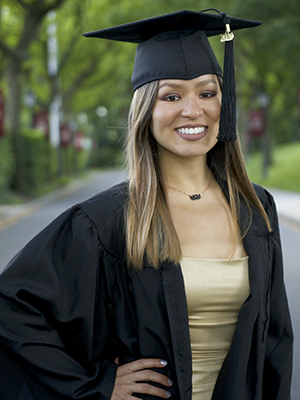
Elsa Au-Yeung
School: Fordham College at Rose Hill
Major: Biological Sciences
Minor: Bioethics
Current Job: Research Associate, Inflammation and Immunology, Regeneron Pharmaceuticals
“One of the things I am the most grateful for from my experience at Fordham was actually learning about things not related to my major. Since we are required to take the core curriculum, I was exposed to so many different classes I never would have taken otherwise. These courses refined the way I think about virtually everything. Buddhism in America helped me discover my interest in Buddhism, and Intro to Bioethics challenged many preconceived beliefs I had about the health care industry and controversial ethicists.”
Read more of Elsa Au-Yeung’s story.
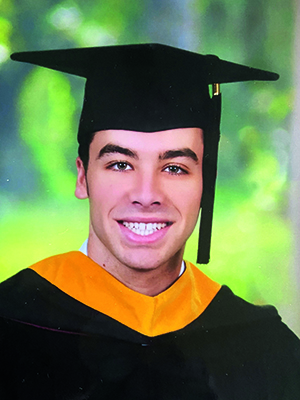
Reed Bihary
School: Gabelli School of Business
Major: Business Administration
Concentrations: Finance, Global Business
Minor: Economics
Current Job: Corporate and Institutional Banking Development Program Associate, PNC Financial Services
“Through the Gabelli School of Business, I was immediately taught the importance of networking, which helped me land multiple internships and gain a better understanding of which profession I wanted to pursue after graduation. The Fordham Mentoring Program helped to prepare me for interviews and expand my professional network. Connections I made with alumni through this program were pivotal in aligning me with the job I have today.”
Read more of Reed Bihary’s story.
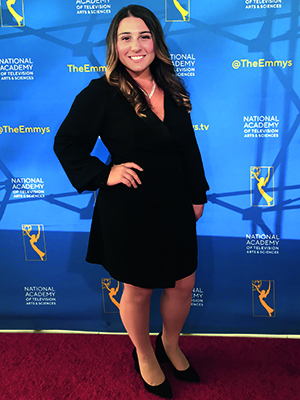
Natalie Migliore
School: Fordham College at Rose Hill
Major: Journalism
Minor: Communication and Media Studies
Current Job: News Anchor/Writer, iHeartMedia
“Working at WFUV was hands down the best decision I ever made. It changed the trajectory of my life. I was going to be a business major, and walking into WFUV, I just fell in love with journalism. I wouldn’t have known about the position at iHeartMedia if it weren’t for having a connection from Fordham and WFUV. That reinforced [the importance of the]alumni network. Another thing I wouldn’t have gotten almost anywhere else was the small class sizes at Fordham. I built great relationships with my professors, and they’ve become great mentors to me.”
Read more of Natalie Migliore’s story.
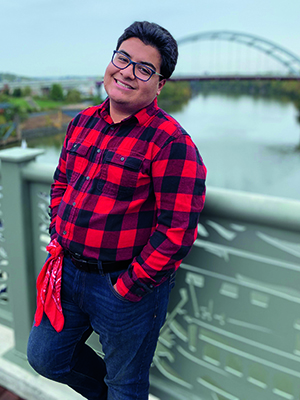
John Morin
School: Fordham College at Rose Hill
Major: Political Science
Minors: American Studies, Mathematics
Current Job and Studies: Communications Associate, Regis High School; M.A. Candidate, Elections and Campaign Management, Fordham
“I was always surrounded by diverse experiences and perspectives, and the ability to have constructive conversations on complicated issues with my peers was amazing. The intro course for my American studies minor was one of the most important experiences I had. The professor, Diane Detournay, wanted us to challenge conventional thinking and advocate for needed change. The ideas she presented in class, I will always carry with me.”
Read more of John Morin’s story.
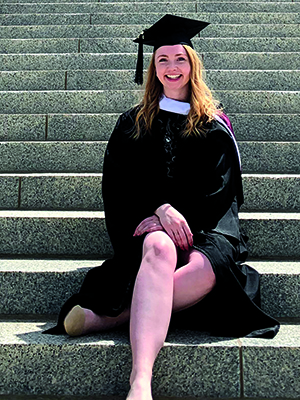
Finley Peay
School: Fordham College at Lincoln Center
Majors: Political Science, American Studies
Concentration: American Catholic Studies
Minor: Theology
Current Studies and Job: M.A. Candidate, Higher Education and Student Affairs, NYU; Graduate Assistant, Columbia University’s Office of University Life
“The biggest thing that I got out of Fordham was the breadth of the mentorship network. I got the best of both worlds participating in academics and student involvement at both Lincoln Center and Rose Hill. I’m still in touch with a lot of the administrators I worked with in the Office for Student Involvement. That’s one of the things I cherish the most: the number of people I met who genuinely care about students.”
Read more of Finley Peay’s story.
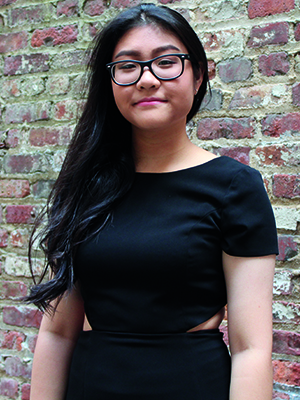
Julie Tin
School: Fordham College at Lincoln Center
Major: Psychology
Minor: Mandarin Chinese
Current Job: Human Resources Administrative Assistant, University Settlement, The Door, Broome Street Academy Charter High School
“Right now I work for a family of New York City organizations that give back to immigrant and low-income communities and provide services to disconnected youth. I had interned there during college, but I had little to no experience in the office setting before I was placed in Fordham’s Office of Alumni Relations for work-study. Through the staff’s guidance and instruction, I was able to develop data management, communication, and organizational skills that serve as the core of my professional abilities.”
Read more of Julie Tin’s story.
—Reporting by Chris Gosier, Adam Kaufman, Kelly Kultys, and Sierra McCleary-Harris
]]>Au-Yeung’s research focus is multiple sclerosis, one of many conditions for which the company is developing therapies. At Fordham, majoring in biological sciences, she discovered not only the joys of research but also many other sources of inspiration.
What are some of the reasons why you decided to attend Fordham?
Having been raised in small-town Wilton, Connecticut, I knew I wanted to experience college in the city. Fordham was perfect because it also had such a classic campus atmosphere. And I have always valued small classes because I learn best not only by being challenged but also through actively engaging in discussions and debates. So Fordham was the right choice for me because of the smaller classes with passionate professors teaching them.
What do you think you got at Fordham that you couldn’t have gotten elsewhere?
Prior to coming to Fordham, I was only excited to learn about things pertaining to my major, biological sciences, but through the University’s core curriculum, I was exposed to so many different classes I never would have taken otherwise. I’m thankful that I took these courses because they refined the way I question and think about virtually everything: religion, ethics, myself, the health care industry, et cetera. I gained new interests through many of my core courses, such as Buddhism in America, and Intro to Bioethics challenged many preconceived beliefs I had about the healthcare industry and controversial ethicists.
Did you take courses or have experiences at Fordham that helped you discern your talents and interests and put you on your current path?
Originally I was set on going to medical school after graduating and did not consider anything else. To build my resume and earn money, I applied for an undergraduate research grant for the summer of 2017. Working at the Calder Center, I studied the use of eDNA—or DNA that animals leave behind in their environment—as part of biodiversity and conservation studies at the center.
This experience changed everything for me. I enjoyed it so much that I applied for another grant and worked on cell/molecular research in Associate Professor Patricio Meneses’ lab. These academic experiences motivated me to try out industry research, so I applied for an internship with Regeneron Pharmaceuticals, where I work now. This internship affirmed for me that I wanted to change my medical school plans and pursue research instead. In the spring before graduating, I worked part time at Albert Einstein College of Medicine in the Bronx, contributing to global HPV and HIV studies, after finding this position through Fordham.
Who is the Fordham professor or person you admire the most, and why?
Patricio Meneses—I took his cancer biology and introductory virology classes, and he was my lab mentor. He helped give me the confidence to pursue the life I wanted after I graduated. His intelligence is admirable and his life story of getting where he is today is inspiring. He didn’t discover his passion or “dream job” by following one path; he went through different career paths, all of which led him to where he is today. It’s admirable because I am a planner, and his story and advice remind me that you don’t necessarily have to know where you want to be a year from now.
Can you describe your current responsibilities? What do you hope to accomplish, personally or professionally?
I’m a research associate working in Regeneron’s Immune and Inflammation Group. My group focuses on autoimmune diseases, but I specifically work on multiple sclerosis. My responsibilities include developing, optimizing, and testing candidate therapeutics for MS in mouse models and downstream analysis of associated disease-related pathologies. My professional goals are to continue learning (since the learning curve is steep), and my long-term goal is to become a scientist.
Is there anything else we should know about you, your plans, or your Fordham connection?
While I love science, I also love to travel, paint, cook/bake, and run long distance. I also would love to be a resource for current pre-med students or help out in any way I can as a proud Fordham alumna.